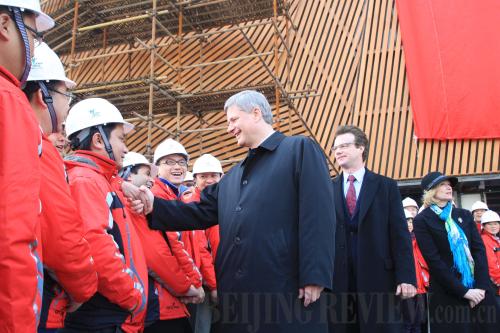|
 |
|
ACKNOWLEDGEMENT: Canadian Prime Minister Stephen Harper greets Chinese workers at the Canadian pavilion for the 2010 Shanghai World Expo on December 5 (CNSPHOTO) |
China and Canada need to advance their ties through strengthened bilateral exchanges and joint efforts to address global challenges, according to a mutual agreement between the two countries.
Canadian Prime Minister Stephen Harper toured Beijing, Shanghai and Hong Kong from December 2 to 6 in a visit the Chinese media called "long overdue." Indeed, it was his first official visit to China since taking office in 2006.
"China-Canada relations experienced twists and turns in recent years, in the interests of neither side," Chinese Premier Wen Jiabao told his Canadian counterpart. "The two nations do not have fundamental conflicts of interest, and common interests far outweigh disparities."
Harper's Conservative government had taken a hard line on China, playing up the two countries' ideological differences and initiating a chill in China-Canada relations.
In the face of global challenges such as the international financial crisis, climate change and energy security, China and Canada should deepen cooperation to foster win-win results, Wen said.
China welcomes Canada's efforts to pursue a trade diversification strategy and increase its exports to China, he said. Moreover, he added, both sides should speed up negotiations on an investment promotion and protection agreement to provide a legal framework for mutual investments.
Meanwhile, China is ready to further engage in Canada's Asia-Pacific Gateway plan by taking part in the construction of ports, railways, roads and telecommunications facilities. The potential for cooperation in the fields of environmental protection, green economy, energy and mining is also huge, Wen said.
Likewise, both sides should boost exchanges in education, culture, sports and tourism and between media organizations to cement people-to-people bonds, he added.
There are 1.3 million Chinese-Canadians in Canada, making Chinese the third most used language there after English and French. Two-way trade between China and Canada, meanwhile, totaled $34.5 billion—a several-hundred-fold increase over the amount when they established diplomatic relations in 1970, which stood at $150 million, according to Chinese statistics.
While meeting with Harper, Chinese President Hu Jintao echoed Wen's proposals. He said both sides should bring into full play their respective advantages, expand economic, trade and technological cooperation and jointly oppose trade and investment protectionism.
During Harper's visit, the two countries signed cooperative documents on climate change, mineral resources, culture and personnel training.
In a joint statement, moreover, China and Canada pledged to work together closely in law enforcement and the extradition of fugitives. They also agreed to contribute to the reform of the international financial system, while helping to resolve major international issues, including nuclear non-proliferation, food security, global health threats and climate change.
While granting Canada the approved tourist destination status, China will open its fourth Consulate General in Canada in Montreal—a move expected to facilitate the flow of tourists, students and business people between the two countries.
Harper, for his part, announced in Shanghai that Canada would open another four trade offices in China, to supplement the two offices opened in April. | 